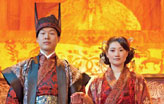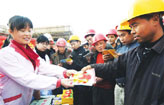Asia
To give or not to give: S. Korean conundrum on Japan aid
Updated: 2011-04-18 21:41
(Agencies)
SEOUL - South Koreans are caught between a rock and a hard place - literally as well as figuratively -- when it comes to giving cash donations to their neighbors in Japan after last month's massive earthquake and tsunami.
Renewed anger over a group of rocky islets claimed by both nations -- known as Dokdo in South Korea and Takeshima in Japan -- has caused a sharp cooling in South Korean impulses to help.
At first, Korean pop singer Kim Jang-hoon, dubbed "the angel of donation" for his habit of donating many of his concert proceeds to the poor and campaigns to promote his country, asked his fans to put aside their decades-old animosity toward Japan over Dokdo in the wake of the 9.0 March 11 disaster that has left nearly 28,000 dead or missing.
Many ordinary South Koreans responded generously, and a dozen K-pop stars donated more than $5 million.
But the mood soon darkened after a Japanese education panel authorised the publication of school textbooks that assert Japan's claims to the islets, which act as a stark reminder of Japan's brutal colonial rule over Korea from 1910-1945.
For many, this meant all donations were off.
"It is heart-wrenching that Koreans with a big heart wanted to donate money for Japan, which keeps insisting on its sovereignty of the islands that are undeniably ours," said Yeo Mi-ok, a 51-year-old art teacher staging a display of children's drawings of the islets at a busy Seoul subway station.
A Seoul district office that raised about $10,000 for Japanese disaster relief changed its mind and sent most of the funds to a civic group promoting Korea's claims to the islets, which are also a symbol of South Korea standing up to its neighbour.
"I asked myself, why did Japan do this at this tragic moment. We had to discuss what to do next with this fund," said Ra Tae-sung, an official at the office in southwestern Seoul.
Prior to the quake, relations between the neighbours had been improving.
Tokyo has backed Seoul's tough stance towards North Korea following the sinking in March 2010 of a naval ship, blamed by the South on Pyongyang, as well as the North's bombardment of a South Korean island in November. They had even agreed to upgrade their military cooperation.
But for years, South Korea has rebuffed calls from Japan to discuss the Dokdo dispute at the International Court of Justice and announced plans to beef up governance of the islets through measures including research institutes in the area.
"Japan is not wise, making a lot of Koreans with sympathy feel more hostile than before," said Choi Ji-yong, a 27-year-old office worker.
E-paper

Han me downs
Traditional 3,000-year-old clothes are making a comeback.
Reaching out
Fast growth fuels rise in super rich
Chinese tourists spend more
Specials

Big spenders
More mainland tourists are expected to spend money on overseas travel this year.

Rise in super rich
Report cites rising property prices, gdp as key drivers of increasing number of chinese millionaires.

Reaching out
Condom makers are stepping up their presence in smaller cities to boost sales
